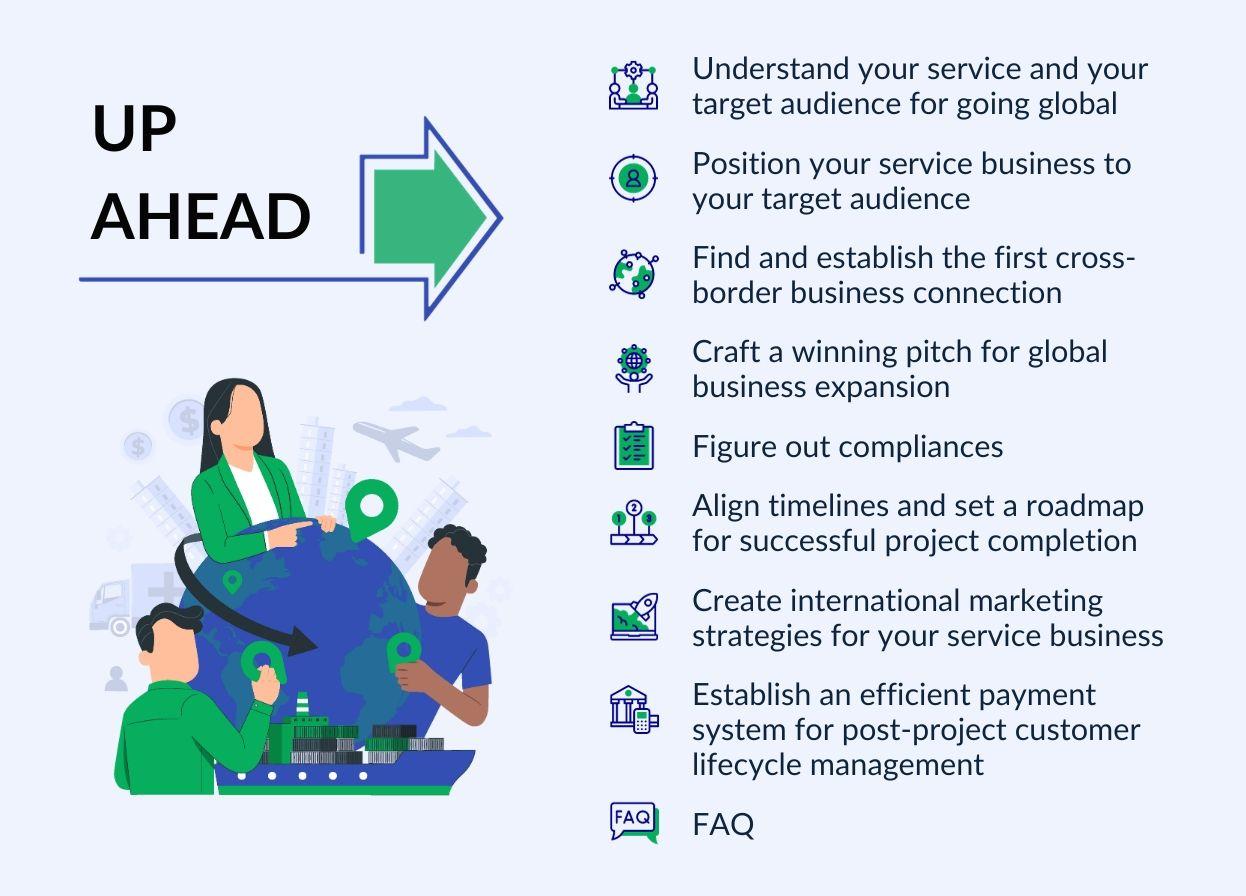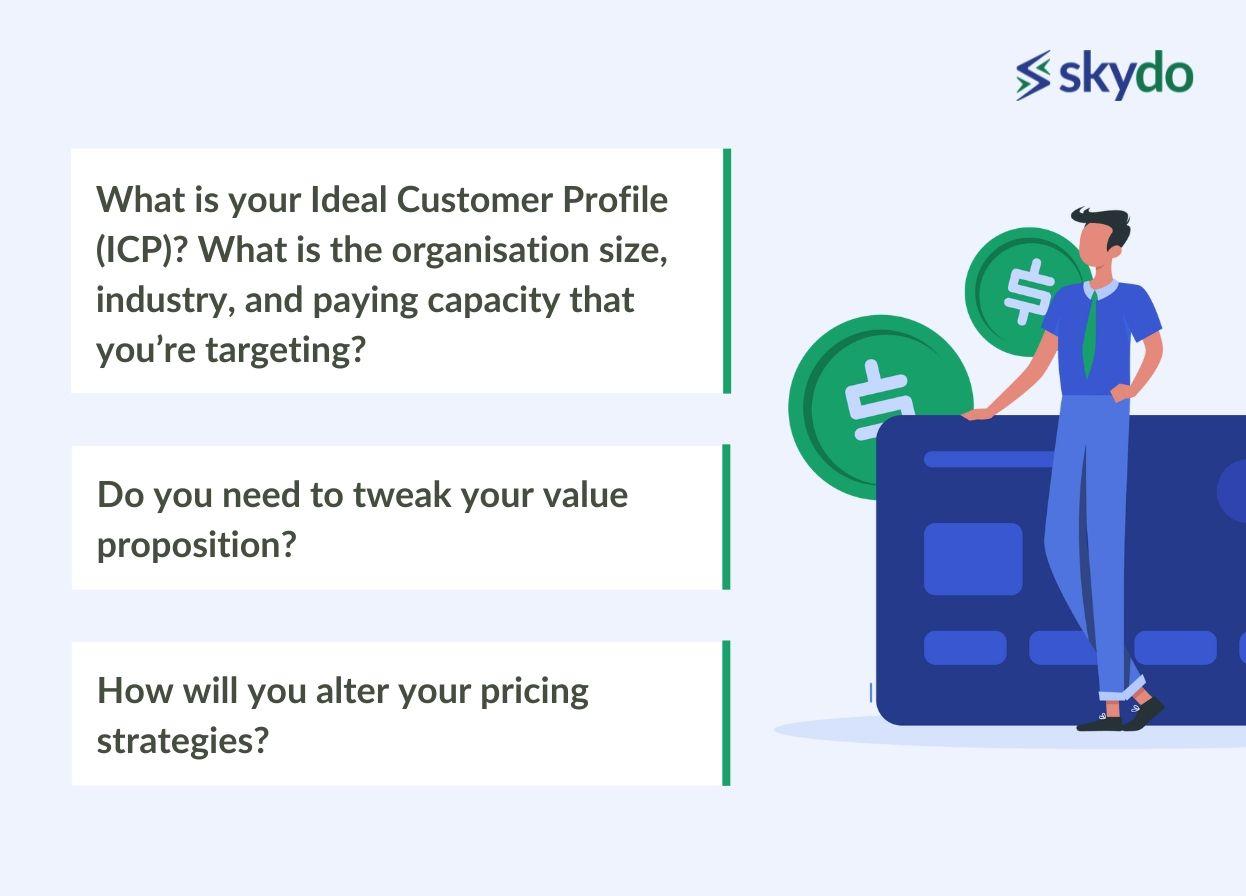8 Steps to Take Your Service Business Global



“Macha, that’s where the money is!” When business owners like you hear this, you may wonder if you’re doing the right thing, serving only domestic clients. Whether it is looking at the LinkedIn posts of our ex-boss who took a new job role in Singapore or Instagram stories of batchmates who started their careers in Silicon Valley, working with global clients has its allure.
The reason to pursue this can be many: financial reward, exposure to newer learnings, or simply the sheer thrill of venturing into newer markets. Irrespective of your motivation, expanding your service business globally is a huge step.
Many Indian businesses are going global - both small and big. It includes multi-billion dollar corporations like Infosys and TCS to newer SaaS startups like Vymo (which is serving 65+ global corporations with 3,00,000+ users). Moreover, Indian businesses are adequately equipped to serve a global clientele.
We have a large, English-speaking, young workforce, proficient in IT and relatively cheaper than our Western counterparts. Indian service exports hit $273.6 billion in 2022 and are set to cross $750 billion in 2023. Additionally, over 63 million MSMEs in India already contribute to about 40% of India’s overall exports. This means that you have an immense opportunity to grow and serve international clients.
It's a decision that can bring immense opportunities but also some hard challenges. The world is full of stories of businesses that failed to go global. However, there are also stories of businesses that successfully expanded globally and transformed into global giants.
This easy-to-follow, eight-point checklist especially for Indian service export businesses will guide you through your first phase of global expansion and help you overcome challenges related to your global business strategy.
These tips have been curated based on years of experience working with service businesses like yours, helping them expand globally.
1. Understand your service and your target audience for going global
What are the factors leading to your business’s success in the domestic market? You need to identify your service business’s unique attributes and selling points against your competitors.
If you’re a software development company selling imaging software to the healthcare industry, you can tailor your marketing efforts to target potential customers in the global healthcare industry.
Break them down and ask these questions if they must be adapted to the global audience.
- What is your Ideal Customer Profile (ICP)? What is the organisation size, industry, and paying capacity that you’re targeting?
- Do you need to tweak your value proposition?
- How will you alter your pricing strategies?

Moreover, apart from understanding your market-specific aspects, you also need to analyse that country’s overall economic and political scenario. This can be done by analysing their GDP, inflation rate, political stability, international relations with your country and level of business-friendly environment provided by the country.
These will ensure you balance between short-term and long-term opportunities that a country provides. For example, a country that provides generous incentives to help businesses become technology-ready could be a lucrative opportunity for an IT services company.
2. Position your service business to your target audience
After understanding your buyer persona/target market, the next step is to make changes to your existing perception (if needed).
- Understand your customers’ needs, preferences, and pain points. How is your service solving their challenges?
- Customise your website and LinkedIn pages to reflect that understanding. Instead of selling through features, focus on the benefits your customers get.
- Use outside-in research and talk to other exporters to gain insights.
For example, if your target audience is in the Middle East, you must adjust your marketing messaging and language to appeal to that audience. Exercise cultural sensitivity while highlighting how your solutions can address specific challenges faced by them.
3. Find and establish the first cross-border business connection
You can achieve this step either through a digital route or a physical route. Cold reachouts through email campaigns, social platforms, or inbound activities like SEO are effective. Similarly, you can:
- Become part of industry-specific international associations
- Participate in trade shows. For example, If you're targeting the healthcare industry in the US, you might attend a trade show focused on healthcare technology like HIMSS Global Health Conference.
- Establish collaborations with local businesses to make them your referral/distribution partners

You can always request common connections to introduce you to their network since referrals have a 70% greater chance of getting leads and, eventually, acquiring new clients.
4. Craft a winning pitch for global business expansion

There are four elements to a winning pitch.
- Present a professional pitch deck that puts you in a credible light
- Clearly articulate your value proposition in helping them solve specific problems
- Show social proof for their use cases, and include case studies for past work
- If possible, perhaps offer a free trial to initiate a pilot project
Let’s consider you are pitching accounting software to potential ACCAs in the UK. You may highlight how your software solutions can help them comply with UK-specific tax laws or provide examples of how you've successfully helped other UK-based accountants. Proven track records help in converting customers faster.
Additionally, you can provide a limited free trial for the potential customer to understand how the software works and whether it will suit their needs.
5. Figure out compliances
You may be ready to expand business, but the maze of regulations and compliances deters many businessmen from going global. Before engaging in international transactions, it's crucial to understand the rules of cross-border business. This involves understanding:
- Entity structures
- Invoicing
- Payment preferences and terms
- Legal contracts
- Jurisdictions in case of disputes
- Taxation policy
If you’re working with Singapore-based venture capitalists and consultants, you need enough information about prevailing invoicing guidelines and taxation in Singapore. You may need to hire a local legal or accounting firm to consult and ensure compliance with the laws.
6. Align timelines and set a roadmap for successful project completion
Once you've established a relationship with your client, it's important to align on timelines, milestones, and execution roadmap to ensure that you're meeting their expectations.

- Is it one large project of 18 months or 6 mini projects of one module per quarter?
- What will be the buffer time if you miss any milestone?
- When will each payment come? In the event of a delayed payment, will the work go on or be paused?
Effective communication is the key to a successful project completion framework. A wise decision is to dedicate a single point of contact for the client to speak to. Keeping them updated on the project’s progress regularly is crucial, especially if things are not going as per the plan. Do not assume or expect.
They might require more changes than you think. A dedicated project manager shall communicate, manage the project, and ensure that it's delivered on time and within budget.
On your side, they may also be leading the daily scrum call or updating you on project milestones. Map the potential areas of friction and prepare to resolve them. This will help you manage the project effectively and deliver it on time and within budget.

7. Create international marketing strategies for your service business
Expanding a service business globally requires a firm knowledge of international marketing tactics. To access a worldwide audience, utilise diverse platforms like social media, search marketing, and online advertising. Leverage forums, email marketing, and other targeted channels to enhance outreach.
Craft region-specific strategies and tailor marketing to diverse platforms for effective global promotion. Determine the optimal sales model and establish a comprehensive marketing plan with measurable KPIs.
Generate new leads and assess pricing models relative to competitors. Your go-to-market strategy should prioritise flexibility to adapt to uncertainties and evolving trends.
8. Establish an efficient payment system for post-project customer lifecycle management
Your work doesn’t end once the project is completed. It's important to maintain a good relationship with the customer.
Many times a company does well in the core areas of creating a valuable service and identifying the right market to cater to but still finds it difficult to grow rapidly due to a disorganised payment process.
Imagine doing all the hard work of providing value to your client and then finding out that your payment is stuck or you lose out on some profits during payments.
As soon as you start a business in a new geography, you will begin receiving and sending money abroad. This will bring a set of new aspects regarding international payments that you need to start planning for.
This step involves raising invoices on time, clearly aligning payment options, and ensuring regular payment follow-ups. Feedback calls to identify areas of satisfaction and improvement ensure you get repeat business, referrals, and positive word of mouth.
Additionally, an international business will usually be dealing with multiple currencies - the target market’s currency, the business’s local currency and probably even a third currency (like USD).
Thus it becomes important for the business to have a system in place for currency exchange conversions and fluctuations. Studying the volatility of that country’s currency will help in analysing and planning for that risk better. Choose the right banking partner or payment service provider to save on hefty transactions and forex conversion fees.
Summing it up
Expanding your service business globally can be a challenging and rewarding experience. By following this eight-point checklist, you can ensure that you're taking the right steps to succeed in your cross-border business.
Remember, expanding your service business globally is a big decision, and it's important to do it right. By following this checklist, you can navigate the challenges and take your business to the next level. So, take the leap and get started on your journey to global success!

TL;DR
The following are the critical components of successful global expansion.
- Understand your service and target audience
- Position your service correctly
- Find and establish the first connection
- Make a winning pitch
- Figure out compliances
- Align with the client on timelines and milestones
- Project Management
- Post-project customer lifecycle management
FAQs
Q1. What is global business?
Ans. Global business refers to conducting commercial activities internationally of goods or services across national borders. It encompasses a wide range of activities, including trade, investment, distribution, etc. It has led to increased economic independence among countries and has created both opportunities and challenges for businesses seeking to expand their operation worldwide.
Q2. When looking to expand your business internationally on social media, what should you do first?
Ans. The first step is thorough market research. Understand the cultural nuances, preferences, and trends in your target countries. Tailor your content and advertising strategies to resonate with the local audience to maximise engagement and success.
Q3. Why is global business important?
Ans. Launching a global business is crucial for several reasons. It broadens market opportunities, reduces dependence on a single market, fosters innovation through diverse perspectives, and can lead to cost efficiencies. Additionally, it promotes economic growth, cultural exchange, and international collaboration, contributing to a more interconnected and prosperous world economy.






